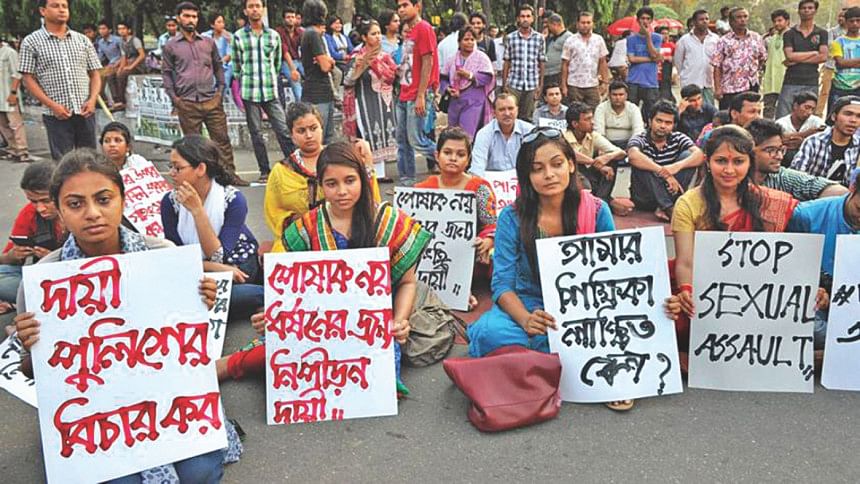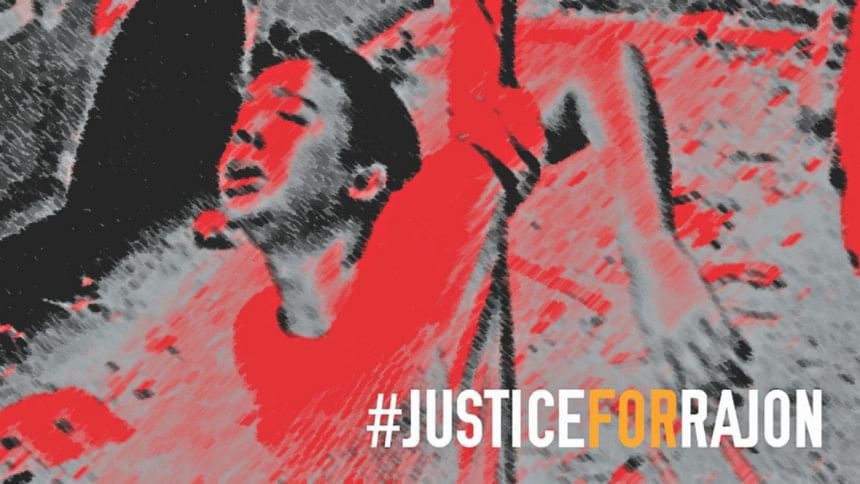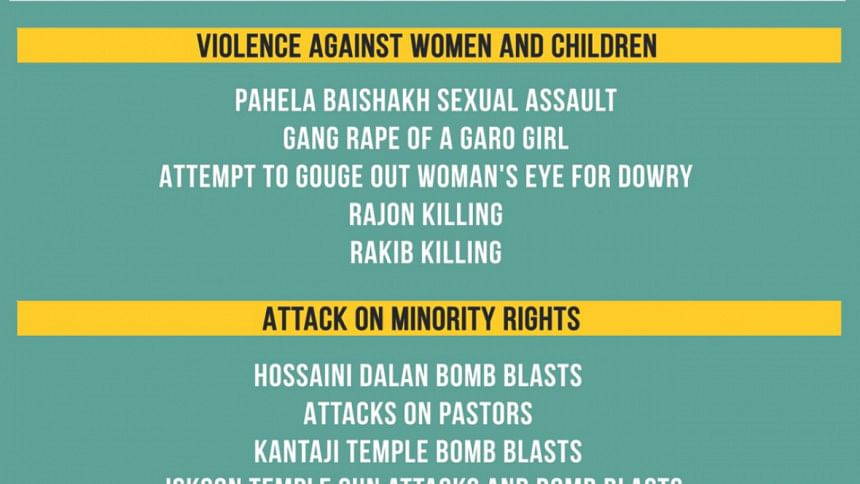When rights go wrong

NOT only was 2015 filled with moments of national pride and joy but also moments of national tragedy and shame. Bangladesh was faced with some of the worst instances of violence against women, children and minorities in 2015.
Unabated violence against women and children
The mass molestation of at least 20 women for over an hour by gangs of rowdy youths during Pahela Baishakh celebrations in early 2015 hit international headlines bringing Bangladesh condemnation from all quarters.
Later in the year, the sensational murders of Rajon and Rakib, both minors, that left us shaken to the core, provoked national outcry and brought worldwide attention to the pathetic state of child rights in the country, resulting in one of those rare moments of justice being served as six men were finally sentenced to death for the two killings.
But when such gruesome acts are not highlighted on social media, when they fail to garner enough attention so as to trigger nationwide outrage, acts of cruelty against women and children largely go unpunished. There is little to no doubt that justice for Rajon would not have seen the light of day if it weren't for social media, especially since the killers did not have any political affiliations. I point out the latter because how else would you explain the sex offenders of the Pahela Baishakh incident getting away with molesting women in broad daylight? The truth is that everyday violence that women and children face, primarily at the hands of grown men, hardly ever make it to mainstream news and media.
In early 2015, Khadija Begum's dead body was found in the West Baligram area. Her family claims that since she got married six years ago, she was constantly harassed and tortured by her in-laws and husband for dowry. As a result of the brutal torture, Khadija had even suffered a miscarriage previously.
On November 2015, Shima Akhter was tortured to death by her husband, Md Shohel, at Amanatpur village in Begumgonj upazila of Noakhali. Shima's mother-in-law, sister-in-law and husband would often beat her demanding a payment of Tk 50,000 for dowry. After Shima refused, she was electrocuted by Shohel and his sister as Shima was sleeping. She later died at a private hospital where she was admitted.
Such tragedies are abound and violence against women is no longer seen as an anomaly.
According to Ain o Salish Kendra, between January and September of 2015, 667 incidents of rape took place with 48 of them resulting in the victim's death. 128 of these victims were between 7 to 12 years old. During the same period, 167 women were murdered by their husbands, 191 women have been victims of sexual harassment (9 of whom committed suicide) and 129 women were tortured to death in dowry-related violence. (Note: The real numbers are likely much higher because many such incidents go unreported)
Violence related laws in Bangladesh include the Penal Code, 1860, the Anti-Dowry Prohibition Act (1980), the Cruelty to Women Ordinance (1983), the Suppression of Immoral Traffic Act (1993), and the Prevention of Repression against Women and Children Act (2000). But these laws are poorly enforced due to the indifference of law enforcement agencies, corrupt-ridden practices within the criminal justice system, and various other reasons, resulting in aggrieved girls and women rarely granted justice.
A continued executive interference in the judiciary, which is supposed to be independent and is responsible for the enforcement of fundamental rights through its constitutional jurisdiction, has fast led to an erosion of trust in the legal system. Partisan politicisation of the judiciary and a complex, high cost legal process has exacerbated public perception of the judicial system.
The few incidents of violence against girls and women that somehow make it to the news in the form of a 200 word backpage story are hardly ever followed up, both by the media or law enforcement agencies. Such is the fate of most women whose stories are either buried alongside their dead bodies or lost somewhere in cumbersome statistics.
While there is no doubt that women in Bangladesh have made great strides in various spheres of life, women's empowerment (a term that is often discussed without a consideration for its many nuances) and women's rights still have a long way to go.
The state of child rights, too, remains abysmal due to the lack of implementation of existing laws and international treaties. For instance, despite the fact that Bangladesh has ratified the Convention on the Rights of the Child (CRC), which guarantees children's right to life, survival and development on the national agenda, the Child Act 2013 (which replaced the Child Act 1974) that recognises an individual below 18 as a child, and the Labour Act which prohibits employment of children under 14, cruel treatment of children and child labour remain rampant.
One of the factors that make the enforcement of these legislations so challenging is the fact that millions of children work in the informal sector. The UN Committee on the Rights of the Child has claimed that children in Bangladesh work in five of the "worst forms of child labour": welding, auto workshops, road transport, battery recharging and tobacco factories.

Child labour is widely accepted largely
because of social norms and harsh economic realities. Poverty, the number one driving factor behind child labour, perpetuates this vicious cycle as poor families dependent on child labour not only fail to send their child(ren) to school but also deem it okay to do so because of the low perceived value of education. The concept of child rights seems to be alien to many, including law enforcement agencies who treat children as they would an adult.
Children are exposed to severe forms of physical and mental violence at homes, educational institutions and public places. A ten-year-old boy was beaten to death in a madrasa in Barguna on August, 2015, a seven-year-old boy was found chained in shackles in a madrasa in Pabna on November, 2015 and two girls were seen being beaten in a leaked video at an orphanage in Barisal on July, 2015.
Furthermore, Bangladesh has one of the highest rates of child marriage in the world and the highest rate of marriage of girls under 15. Despite the fact that the Majority Act, 1875 clearly provides that a woman must at least be 18 years of age to be able to get married, social norms, religious beliefs, and glaring poverty, once again, trump the law, and young girls are forced into marriage by families hoping to rid themselves of the girl child seen as a “financial burden”. The punishment of either imprisonment of up to one month and/or a fine of up to Tk 1,000 hardly acts as a deterrent.
However, it is to be noted that although significant progress is yet to be made in the realm of women's and child rights, commendable initiatives have been taken by the government, rights organisations and NGOs. On December 21, 2015 the cabinet approved a policy that fixed the minimum age for domestic helps at 14, with a focus on fair wage, decent working hours, maternity leave and legal actions against physical and verbal abuse, among other things. More girls than boys are now in school, school enrolment has increased and dropout rates have reduced. Furthermore, the Bangladesh government, by putting women at the forefront of international conflict and disaster management, has secured the historic achievement of having one of the only three all-women peacekeeping units in the world, and has laudably defied the stereotypical notion that often views women within the confines of the home.
But these initiatives are a small step towards fully restoring women's and child rights in the country. And as the saying goes, "A journey of a thousand miles begins with a single step." Along with universal education and elimination of poverty, a transformation in the national psyche and social consciousness is needed if child labour, child marriage, physical/sexual/mental violence against women and children, and other forms of abuse are to be completely eradicated.

Infringement upon minority rights
2015 has been yet another year of violence and discrimination for minority communities in Bangladesh. For the indigenous people in the Chittagong Hill Tracts (CHT), communal tension and land disputes have continued to bring misery. Today, 18 years after the CHT Accord has been signed by the government and the Parbatya Chattagram Jana Samhati Samiti (PCJSS), some of the core provisions of the Accord are yet to be implemented.
In an article titled "Why a roadmap is of utmost importance" published in this daily, Jyotirindra Bodhipriya Larma, one of the signatories of the Accord and President of PCJSS, states that some of the unresolved central issues include "resolution of land disputes after inserting necessary amendments to the CHT Land Dispute Resolution Commission Act 2001 in line with the CHT Accord; rehabilitation of internally displaced persons and India returnee refugees to their respective homesteads with restitution of their lands to their rightful ownership; dismantling of all temporary military camps including 'Operation Uttoran'; and rehabilitation of the Bengali settlers outside CHT with due honor and dignity." Larma claimed that decades of empty promises have been made to the people of the CHT in an attempt to give the impression that the Accord is being implemented, when in reality, it's far from it.
Discriminatory restrictions on foreigners visiting the CHT region were imposed by the government in 2015, following which it came under both national and international criticism. According to the memorandum, foreigners are required to obtain permission from the government if they wish to visit the CHT. Although the government revised the directives, it retained the restrictions.
Groups in the CHT region have been carrying out protests against the establishment of Rangamati Science and Technology University and Medical College since the CHT Accord has not been fully implemented. Rights organisations argue that upon the establishment of the university and medical college it would draw a closure to the implementation process of the Accord and reignite Jumma-Bengali tensions. Moreover, the Pahari Chatra Parishad and Hill Women's Federation have raised concerns about the fact that local permanent residents including the CHT Regional Council and Hill District Councils have been completely left out of the decision-making roles in the running of the two institutions.
According to the Internal Displacement Monitoring Centre, an organisation that monitors and analyses issues of internal displacement worldwide, around 280,000 people continue to live in displacement in CHT as a result of the insurgency of 1973-1997. Internally displaced people (IDPs) include not only the indigenous people of the CHT, but also Muslim Urdu speakers, Hindus and Buddhists. A total of 431,000 people remain displaced as a result of past conflict and violence in the present day. Most of the IDPs belong to minority groups who have been displaced much more disproportionately than majority Muslim Bangalis.
Land grabbing by influential quarters and suppression of the rights of the indigenous people continued unabated while the trend of violence against indigenous women and children saw an alarming rise in 2015. During the period January-July 2015, a reported 56 indigenous women and girls were subjected to violence.
2015 was also marked with the first ever attack on the gathering of Shia Muslims on the occasion of Ashura in Old Dhaka's Hossaini Dalan. Around three improvised explosive devices were detonated, killing at least one person and injuring scores of others. This kind of sectarian violence, attacks on church pastors, Hindu temples (Kantaji temple, Iskcon temple), Hindu bloggers, and hate speech targeted at minorities often spewed and endorsed by the thousands in the online space (Liton Das incident, for e.g.), points to the glaringly shrinking space for minorities in a "secular" Bangladesh.
A new year of hope
As we ring in 2016 with much pomp and celebration, we hope that the new year will be unlike 2015 in many ways, one that will not mirror the horrific incidents that have made the nation bow its head in collective shame. We hope that the government will fully commit itself towards upholding civil liberties for all and suspend the prevailing culture of impunity that allows perpetrators of violent crimes, be it against women, children or minority groups, to go scot-free.
It is with a renewed sense of optimism that we wish for 2016 to be a much more tolerant, stable and prosperous year, free of unending political, communal and sectarian violence. A year in which inter-religious tensions are not stoked for political purposes, a year of peaceful co-existence in this diverse land of ours, and a year in which the fundamental rights of the country's people are protected.
The writer is a member of the Editorial team at The Daily Star.

 For all latest news, follow The Daily Star's Google News channel.
For all latest news, follow The Daily Star's Google News channel. 



Comments